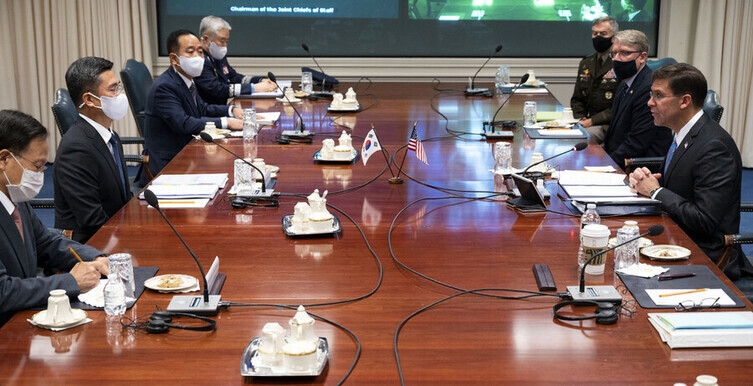hankyoreh
Links to other country sites 다른 나라 사이트 링크
US puts processes for OPCON transfer scheduled for 2021 on hold

The US has reportedly told South Korea that the second stage of assessing the military capability of their future Combined Forces Command (CFC) should be delayed because of insufficient preparations. The assessment of the future CFC’s full operational capability (FOC) had been scheduled to be held next year, as part of the preparations for returning wartime operational control (OPCON) to South Korea. This will almost certainly disrupt the South Korean government’s policy of carrying out the OPCON transfer on an accelerated timeline.
An anonymous source in the South Korean government told the Hankyoreh on Oct. 22 that South Korean officials in the recent South Korea-US Security Consultative Meeting had wanted the joint statement to stipulate that the FOC assessment would take place next year, after this year’s assessment was delayed because of COVID-19. But the US refused to include such language in the joint statement, the source said.
Following the OPCON transfer, the future CFC is supposed to be led by an officer from the South Korean military. South Korea and the US have agreed to carry out the transfer after assessing the future CFC’s capabilities in areas including operations, intelligence, logistics, and communication. The assessment takes place in three phases: initial operational capability (IOC), full operational capability (FOC), and full mission capability (FMC).
Under this plan, South Korea and the US completed the first stage (IOC) of the assessment last year and were planning to carry out the second stage (FOC) this year, until those plans were delayed because of the COVID-19 pandemic.
When South Korean officials said during the Security Consultative Meeting that the FOC assessment delayed this year should take place next year, the US reportedly rejected that idea on the grounds that neither of the two sides weren’t ready yet and that strengthening joint defense readiness currently takes priority over the OPCON transfer.
South Korea and the US had agreed in their 2019 Security Consultative Meeting to carry out the FOC assessment in 2020. “The Minister and the Secretary decided to pursue an assessment of Full Operational Capability (FOC) for the Future CFC in 2020,” the two sides said in a joint statement released after the meeting.
But less than a year later, the US has suddenly refused to carry out its previous agreement on the dubious grounds of “inadequate preparations,” throwing the OPCON schedule into doubt. The US’ intensifying dispute with China in recent months may have made the US more hesitant to hand over OPCON to South Korea, some analysts say.
While the South Korean government intends to keep pushing for an early OPCON transfer through additional deliberations if the upcoming US presidential election brings the Democrats to power next year, it’s too soon to say what stance they would adopt on the question of the OPCON transfer. Considering that a new administration generally spends six months reviewing policy, South Korea and the US would probably not be able to set a new timeline for the OPCON transfer until the second half of 2021 at the earliest.
By Park Byong-su, senior staff writer
Please direct comments or questions to [english@hani.co.kr]

Editorial・opinion
![[Column] Season 2 of special prosecutor probe may be coming to Korea soon [Column] Season 2 of special prosecutor probe may be coming to Korea soon](https://flexible.img.hani.co.kr/flexible/normal/500/300/imgdb/original/2024/0426/3317141030699447.jpg) [Column] Season 2 of special prosecutor probe may be coming to Korea soon
[Column] Season 2 of special prosecutor probe may be coming to Korea soon![[Column] Park Geun-hye déjà vu in Yoon Suk-yeol [Column] Park Geun-hye déjà vu in Yoon Suk-yeol](https://flexible.img.hani.co.kr/flexible/normal/500/300/imgdb/original/2024/0424/651713945113788.jpg) [Column] Park Geun-hye déjà vu in Yoon Suk-yeol
[Column] Park Geun-hye déjà vu in Yoon Suk-yeol- [Editorial] New weight of N. Korea’s nuclear threats makes dialogue all the more urgent
- [Guest essay] The real reason Korea’s new right wants to dub Rhee a founding father
- [Column] ‘Choson’: Is it time we start referring to N. Korea in its own terms?
- [Editorial] Japan’s rewriting of history with Korea has gone too far
- [Column] The president’s questionable capacity for dialogue
- [Column] Are chaebol firms just pizza pies for families to divvy up as they please?
- [Column] Has Korea, too, crossed the Rubicon on China?
- [Correspondent’s column] In Japan’s alliance with US, echoes of its past alliances with UK
Most viewed articles
- 1[Column] Season 2 of special prosecutor probe may be coming to Korea soon
- 2‘We must say no’: Seoul defense chief on Korean, USFK involvement in hypothetical Taiwan crisis
- 3Is N. Korea threatening to test nukes in response to possible new US-led sanctions body?
- 4Division commander ordered troops to enter raging flood waters before Marine died, survivor says
- 5Amnesty notes ‘erosion’ of freedom of expression in Korea in annual human rights report
- 6Is Japan about to snatch control of Line messenger from Korea’s Naver?
- 7No good, very bad game for Korea puts it out of Olympics for first time since 1988
- 8[Editorial] Korea’s surprise Q1 growth requires objective assessment, not blind fanfare
- 9N. Korean delegation’s trip to Iran shows how Pyongyang is leveraging ties with Moscow
- 10Korea’s 1.3% growth in Q1 signals ‘textbook’ return to growth, says government